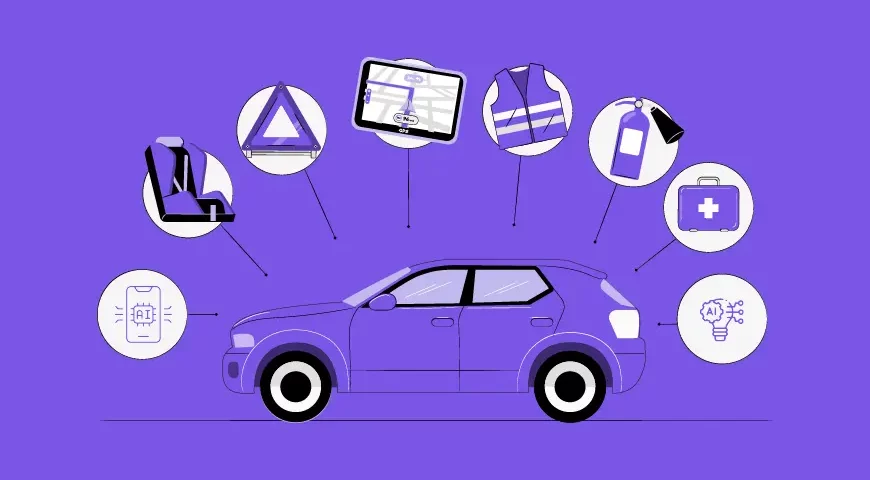As the use of AI grows at a rapid pace, sectors around the world are seeing its advantages. This breakthrough technology benefits all industries, with the automotive industry at the vanguard of the transformation. Leading automobile companies are exploiting their power to provide individualized experiences to their customers. Artificial intelligence benefits not only production but also retail and other sectors of the automobile.

This post will walk you through the latest breakthroughs in the automotive sector, utilizing the benefits of Artificial Intelligence. You will also learn about the benefits and usage cases.
What is AI in the automotive Industry?
AI in the automotive industry refers to the use of Artificial Intelligence to improve the overall driving experience by providing safety and efficiency. AI automotive solutions are built using the power of machine learning, natural language processing, and DL technologies, that enable autonomous driving, and predictive maintenance.
Use Cases of Artificial Intelligence in the Automotive Industry
Artificial Intelligence (AI) is revolutionizing the automotive industry, from manufacturing to the driving experience.
Here are some key use cases:

Autonomous Vehicles and Advanced Driver Assistance Systems (ADAS)
Perception: AI enables vehicles to perceive their surroundings through sensors like cameras, lidar, and radar, interpreting data to identify objects, pedestrians, and road conditions.
Decision-making: AI algorithms make real-time decisions about steering, acceleration, and braking, facilitating autonomous driving capabilities.
Predictive analytics: It can anticipate potential hazards and take proactive measures to prevent accidents.
Predictive Maintenance
Sensor data analysis: AI analyzes data from vehicle sensors to predict potential component failures.
Optimized maintenance schedules: Artificial Intelligence helps determine optimal maintenance intervals, reducing downtime and costs.
Natural Language Processing (NLP) for Infotainment
Voice assistants: AI-powered voice assistants allow drivers to interact with the vehicle using natural language commands.
Personalized recommendations: AI can recommend music, points of interest, and other services based on user preferences.
Intelligent Traffic Management
Traffic prediction: AI analyzes traffic patterns to predict congestion and suggests alternative routes.
Traffic signal optimization: It can also optimize traffic light timings to improve traffic flow.
Enhanced Navigation

Real-time traffic updates: It provides drivers with real-time traffic information and reroutes as needed.
Predictive route optimization: AI suggests the most efficient route based on traffic conditions, road closures, and other factors.
Personalized Customer Experience
Customer preference analysis: Artificial Intelligence analyzes customer data to understand preferences and tailor marketing campaigns.
Personalized vehicle configurations: AI also helps customers configure vehicles based on their specific needs and preferences.
Route Optimization for Fleets
Efficient route planning: AI optimizes delivery routes for fleets, reducing fuel consumption and delivery times.
Driver performance analysis: AI analyzes driver behavior to identify areas for improvement and enhance safety.
Automotive Insurance and Risk Assessment
Risk profiling: AI assesses driver behavior and vehicle data to determine insurance premiums.
Fraud detection: AI helps identify fraudulent insurance claims.
Connected Vehicles
Over-the-air updates: AI enables vehicles to receive software updates wirelessly, improving performance and adding new features.
Vehicle-to-vehicle communication: AI facilitates communication between vehicles, enhancing safety and efficiency.
Manufacturing
Quality control: AI-powered vision systems inspect vehicles for defects.
Robot programming: AI helps program industrial robots for tasks like assembly and welding.
AI is transforming the automotive industry by improving safety, efficiency, and the overall driving experience.
Benefits of AI in the Automotive Industry
Improved Safety
It is one of the major benefits of AI in the automotive industry. AI brings safety gains to vehicles in the essence of advanced road protection. Autonomous safety features like lane departure warnings, emergency brake alerts, and driving assistance assist drivers in making informed decisions by avoiding chances of accidents.
Enhanced driving experience
An infotainment system enables a better driving experience. The smart voice assistants allow drivers to play music, make calls, adjust AC temperature, and others. A driver can easily control everything possible with an AI assistant without moving hands from the wheels.
Improved Efficiency
AI streamlines production processes, reduces waste, and improves overall efficiency. Supply chain AI optimizes organization, inventory management, and transportation, leading to cost savings. AI-powered systems can optimize driving patterns to reduce fuel consumption.

Enhanced Customer Experience
AI can tailor vehicle features, services, and marketing to individual customer preferences. AI-driven infotainment systems offer personalized content and voice-controlled features.
Cost Reduction
By preventing unexpected breakdowns, AI reduces maintenance costs. AI helps streamline operations, leading to lower transportation and inventory costs. AI-powered risk assessment can lead to lower insurance premiums for safe drivers.
Conclusion
AI is revolutionizing the automotive sector by acting as a catalyst for innovation, safety, efficiency, and sustainability. From autonomous vehicles to predictive maintenance, AI-powered solutions are transforming the way we design, manufacture, and experience automobiles. By harnessing the power of data and intelligent algorithms, the automotive sector is poised to deliver safer, smarter, and more personalized driving experiences while optimizing operations and reducing environmental impact. As AI technology continues to advance, its integration into the automotive ecosystem will undoubtedly shape the future of mobility.
In essence, AI is not merely a tool but a strategic imperative for the automotive industry, driving growth, competitiveness, and a new era of transportation.

My admiration for your creations is as substantial as your own sentiment. The visual presentation is tasteful, and the written content is sophisticated. Yet, you seem uneasy about the possibility of presenting something that may cause unease. I’m confident you’ll be able to resolve this issue efficiently.
Somebody essentially lend a hand to make significantly posts I might state That is the very first time I frequented your web page and up to now I surprised with the research you made to create this particular put up amazing Excellent job